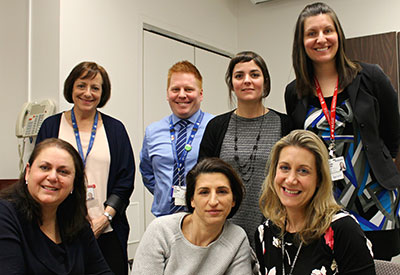Hand in hand for better care
As a patient of the Multiple Sclerosis Clinic at the Montreal Neurological Hospital of the McGill University Health Centre (MNH-MUHC) for more than 20 years, Mari-Jo Pires knows a thing or two about the service it provides.
“Whenever I visit the clinic, I get the personal touch,” says Mari-Jo, who is a patient representative at the MUHC. “But until recently, the phone service was deficient. You called and had to wait or leave a message, and they would call you back, but sometimes you weren’t there. It was a frustrating game of phone tag.”
For the clinic’s staff, the phone situation was also a source of stress: clerical staff were overwhelmed and had to take down dozens of messages, while nurses and doctors worried that they were not meeting patients’ needs in a timely fashion.

“The phone is a pivotal lifeline between patients and the clinic,” explains Diane Lowden, clinical nurse specialist in the MS Clinic. “A simple phone call can prevent unnecessary appointments in the clinic and hospital admissions.”
“The phone is a pivotal lifeline between patients and the clinic,” explains Diane Lowden, clinical nurse specialist in the MS Clinic. “A simple phone call can prevent unnecessary appointments in the clinic and hospital admissions.”
Involving patients as equal partners
In March 2015, the team started a project to improve the phone service with a grant from the Canadian Foundation for Healthcare Improvement (CFHI).
“The lines were a problem, but this project was about more than that,” says patient coach and project co-lead Emmanuelle Simony. “The goal was to create an opportunity for patients to become more involved in their own care.”
The process to select patients to participate in the project was structured and serious, and involved phone and in-person interviews as well as an orientation session.
“We wanted patients who were able to go beyond their own experience, with a broader perspective and a constructive attitude,” says Patient Partnership coordinator Karine Vigneault.
Selected to take part in the project, Mari-Jo was delighted to be on an equal footing with the clinic’s staff and to help other patients.
“It was clear from day one that there was no patient-doctor division,” she says. “My opinions were valued. We were all members of a team working towards one common goal.
A two-pronged approach
The Quality Improvement (QI) project used a structured Lean approach and was carried out from March to October 2015, under the facilitation of Noé Djawn White, MUHC Continuous Improvement advisor in the Quality, Patient Safety and Performance Department. During the first phase, patient advisors, nurses, doctors, administrators and clerical staff took the time to identify and analyze the issue, taking into consideration everyone’s perspective. The team opted for a two-pronged approach: simplifying the access to services by changing the telephone system, and putting in place a nursing helpline. After implementation, the results were impressive. Already on the first week, clerks noticed a decrease in the volume of incoming calls. For patients and staff, it was definitely a big change for the better.
“Our surveys showed we reached our goal of improving by 20 per cent the number of patients and caregivers who said they got the help needed every time they called,” explains Lucy Wardell, Ambulatory Care nursing practice manager for the Neurosciences mission and project lead. “The physicians were particularly pleased with the quantifiable results obtained and the positive feedback from patients. This project has renewed the team’s spirit and energy. It demonstrates that having patients as equal partners when developing improvement projects creates positive impact at many levels.”
Moving forward, the MUHC intends to spread this model throughout the organization with the support of the Patient Partnership Program.
The much improved phone access system
With over 3,700 visits per year, it has a distinct profile in Montreal, the Multiple Sclerosis Clinic of the MUHC’s Montreal Neurological Hospital (MNH-MUHC) offers highly specialized care not easily found elsewhere. Besides benefiting from the expertise of a multidisciplinary team, patients may also participate in important clinical trials of new therapies for MS. The nature of care and services offered at the clinic explains the need for a performing phone service, which was improved by:
- The reconfiguration of the phone system with simplified voice messaging: when patients call, they select the service they need from a menu and the call is routed to the staff member that can best assist them with the particular issue. All scripts are bilingual and written in simple language.
- The implementation of a new nursing helpline – MS Access – for patients calling with clinical issues. A specialist nurse answers calls Monday to Friday, from 9 a.m. to 1 p.m.
- The adoption of online charting, which allows staff to upload notes about the phone consultation in OASIS.